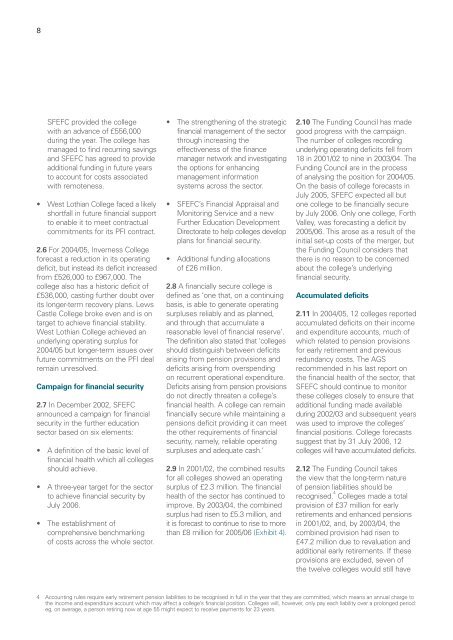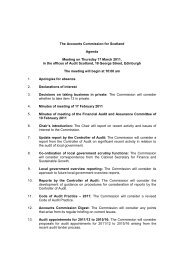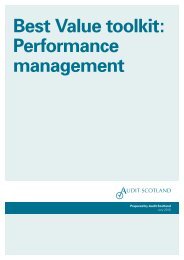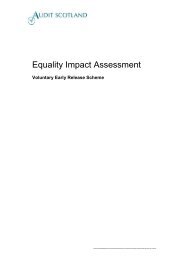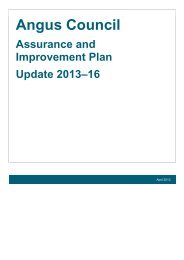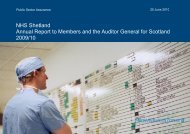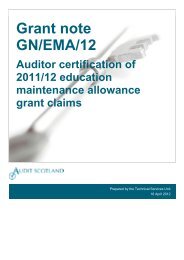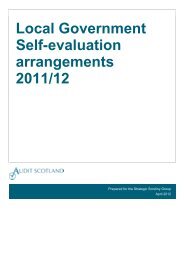Scottish Further Education Funding Council: A ... - Audit Scotland
Scottish Further Education Funding Council: A ... - Audit Scotland
Scottish Further Education Funding Council: A ... - Audit Scotland
You also want an ePaper? Increase the reach of your titles
YUMPU automatically turns print PDFs into web optimized ePapers that Google loves.
8SFEFC provided the collegewith an advance of £556,000during the year. The college hasmanaged to find recurring savingsand SFEFC has agreed to provideadditional funding in future yearsto account for costs associatedwith remoteness.• West Lothian College faced a likelyshortfall in future financial supportto enable it to meet contractualcommitments for its PFI contract.2.6 For 2004/05, Inverness Collegeforecast a reduction in its operatingdeficit, but instead its deficit increasedfrom £526,000 to £967,000. Thecollege also has a historic deficit of£536,000, casting further doubt overits longer-term recovery plans. LewsCastle College broke even and is ontarget to achieve financial stability.West Lothian College achieved anunderlying operating surplus for2004/05 but longer-term issues overfuture commitments on the PFI dealremain unresolved.Campaign for financial security2.7 In December 2002, SFEFCannounced a campaign for financialsecurity in the further educationsector based on six elements:• A definition of the basic level offinancial health which all collegesshould achieve.• A three-year target for the sectorto achieve financial security byJuly 2006.• The establishment ofcomprehensive benchmarkingof costs across the whole sector.• The strengthening of the strategicfinancial management of the sectorthrough increasing theeffectiveness of the financemanager network and investigatingthe options for enhancingmanagement informationsystems across the sector.• SFEFC’s Financial Appraisal andMonitoring Service and a new<strong>Further</strong> <strong>Education</strong> DevelopmentDirectorate to help colleges developplans for financial security.• Additional funding allocationsof £26 million.2.8 A financially secure college isdefined as ‘one that, on a continuingbasis, is able to generate operatingsurpluses reliably and as planned,and through that accumulate areasonable level of financial reserve’.The definition also stated that ‘collegesshould distinguish between deficitsarising from pension provisions anddeficits arising from overspendingon recurrent operational expenditure.Deficits arising from pension provisionsdo not directly threaten a college’sfinancial health. A college can remainfinancially secure while maintaining apensions deficit providing it can meetthe other requirements of financialsecurity, namely, reliable operatingsurpluses and adequate cash.’2.9 In 2001/02, the combined resultsfor all colleges showed an operatingsurplus of £2.3 million. The financialhealth of the sector has continued toimprove. By 2003/04, the combinedsurplus had risen to £5.3 million, andit is forecast to continue to rise to morethan £8 million for 2005/06 (Exhibit 4).2.10 The <strong>Funding</strong> <strong>Council</strong> has madegood progress with the campaign.The number of colleges recordingunderlying operating deficits fell from18 in 2001/02 to nine in 2003/04. The<strong>Funding</strong> <strong>Council</strong> are in the processof analysing the position for 2004/05.On the basis of college forecasts inJuly 2005, SFEFC expected all butone college to be financially secureby July 2006. Only one college, ForthValley, was forecasting a deficit by2005/06. This arose as a result of theinitial set-up costs of the merger, butthe <strong>Funding</strong> <strong>Council</strong> considers thatthere is no reason to be concernedabout the college’s underlyingfinancial security.Accumulated deficits2.11 In 2004/05, 12 colleges reportedaccumulated deficits on their incomeand expenditure accounts, much ofwhich related to pension provisionsfor early retirement and previousredundancy costs. The AGSrecommended in his last report onthe financial health of the sector, thatSFEFC should continue to monitorthese colleges closely to ensure thatadditional funding made availableduring 2002/03 and subsequent yearswas used to improve the colleges’financial positions. College forecastssuggest that by 31 July 2006, 12colleges will have accumulated deficits.2.12 The <strong>Funding</strong> <strong>Council</strong> takesthe view that the long-term natureof pension liabilities should berecognised. 4 Colleges made a totalprovision of £37 million for earlyretirements and enhanced pensionsin 2001/02, and, by 2003/04, thecombined provision had risen to£47.2 million due to revaluation andadditional early retirements. If theseprovisions are excluded, seven ofthe twelve colleges would still have4 Accounting rules require early retirement pension liabilities to be recognised in full in the year that they are committed, which means an annual charge tothe income and expenditure account which may affect a college’s financial position. Colleges will, however, only pay each liability over a prolonged period:eg, on average, a person retiring now at age 55 might expect to receive payments for 23 years.


